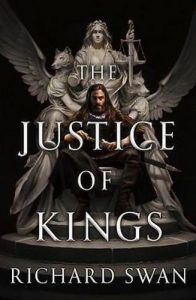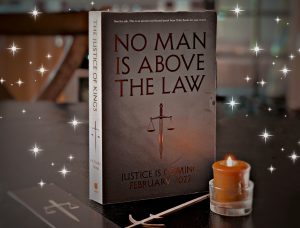THE JUSTICE OF KINGS by Richard Swan (BOOK REVIEW)
The Justice of Kings is the fantastic debut novel by Richard Swan and marks the first book in the Empire of the Wolf trilogy. This is a book which surprised me in many ways, most predominantly we are led to believe the narrator of this tale would be Konrad Vonvalt, the Emperor’s Justice, yet it is not. Helena Sedanka is our narrator, and she gives us a first person account of all that happened during the periods she spent as a clerk accompanying Vonvalt on his duties throughout the Empire.
 By no means was I disappointed by this, in fact this novel truly shines because Swan creates such a compelling narrative voice through Helena. The Justice of Kings is an addictive fantasy Sherlock Holmes-esque tale, with eerie touches of the supernatural, and a thought-provoking reflection on justice, vengeance and morality.
By no means was I disappointed by this, in fact this novel truly shines because Swan creates such a compelling narrative voice through Helena. The Justice of Kings is an addictive fantasy Sherlock Holmes-esque tale, with eerie touches of the supernatural, and a thought-provoking reflection on justice, vengeance and morality.
That’s not to say that Sir Konrad Vonvalt is not at the forefront of this story because he most certainly is, but it is more to say that we see his character through the critical eye of Helena as she chronicles their journey and her own adolescence. The narrative begins with Helena, Vonvalt, the former Legion soldier Bressinger and a priest called Calver, travelling to the village of Rill, where it is rumoured a witch of the outlawed Draedist religion resides. We learn that Sir Vonvalt is the Emperor’s Justice, granted with the authority to be a detective, judge and executioner for any crime committed against the Emperor’s rule. Not only is he granted authority, but he has the power of The Emperor’s Voice, which I’ll discuss later on. Yet even with such power, Vonvalt is a fair man, a man who will give people a chance to right their wrongs before dealing out a harsh sentence. Much to the dislike of Calver, a zealot, who believes any religion practised other than the Nema Creed is punishable by death without leniency, thus sparking an immense conflict between him and Vonvalt.
What follows from then is a journey to Galen’s Vale where Vonvalt, Helena and Bressinger take on an investigation into the murder of a noblewoman, and furthermore where Konrad Vonvalt consequently finds his authority doesn’t quite hold the ultimate sway it once had. You see, this murder may take place in one close-knit setting but as the novel progresses we discover it has far bigger implications throughout the Sovan Empire.
I immediately became immersed and hooked by Helena’s weary, sombre and often regretful tone of narration. Helena is writing these accounts as her older self; she’s a character looking back on her ordeals offering much insight into their mistakes, which I have to say is my favourite kind of narration. This is why I think Swan made the perfect choice, Helena can look at Vonvalt from an outsider’s perspective, she can judge his decisions and in turn we can judge him too without being biased because we only see his deeds through his eyes and his sense of righteousness. Swan uses well-executed foreshadowing throughout, which continuously hints at darker times to come and kept me anticipating what lay ahead for all our characters.
“There was something sad about his itinerant life, devoid as it was of the love of a good woman and a house to call a home. The longer I was
exposed to it, the more I wanted to be free of it. Vonvalt might have been wealthy and privileged, but neither seemed to bring him much joy.”
Being a Justice of the Emperor means that Vonvalt holds arcane powers and secrets passed down through the Order of Justices. Every Justice has their own unique abilities and our Justice has the ability to use the Emperor’s Voice, a means of compelling a person to reveal the truth. There are more attributes to this voice along with imitations and weaknesses, which I found fascinating to see explored. There is one more ability Vonvalt has mastered too, that of necromancy.
Although I have said Vonvalt’s is a man who fairly upholds the law, who lives by the rules and his own moral code, Helena reveals Vonvalt’s flaws too. He can be irrationally quick to temper, at times dismissive of women’s opinions, and ever so naive.
“I have alluded to Vonvalt’s praise before as something that I cherished, but I put it higher than this; it was addictive. It was a sweet elixir.”
Helena’s relationship with Konrad Vonvalt is presented as a complex one. Helena was an orphan on the streets of Muldua, and even though Vonvalt took her in, made her a clerk giving her a life out of poverty, and essentially became her closest friend, he was also a man who had once joined the Legion army, invaded and oppressed her people; he inadvertently played a hand in the cruelty and violence brought upon her ancestors. As we read on it becomes apparent that Helena is not just his clerk but is actually being taught to become a future Justice, and she shows a great talent for it too. But is this the future she wants? Justices are respected and well-educated, yes, and their life might seem privileged compared to most, but understandably because of their powers they are also feared. To go into this profession is to live a life without affection, love and a place to call home.
“I wish I could convey with my quill and ink the awesome figure Vonvalt cut at that moment. He was power incarnate, a wrathful god, as unstoppable as the rising of the sun.”
Which also leads us to Swan’s worldbuilding. Helena offers resentment to how little freedom women have within the Empire, they may be able to be Justice’s like men are and live on their own terms, but for common women their choices were few. Yet it is clear that under the tutelage and service of Justice Vonvalt, Helena has led a life fairly protected and in relative luxury, for all his past deeds his status has granted her much. Which is why it is understandable that Helena spends much time in this novel detailing her deliberation on which path she wanted her life to follow. As much as this book is about justice, it is also about the choices we make in a world where even having a choice is a blessing.
“A small, involuntary moan escaped my lips. It was the helpless, hapless wail of the doomed. Unless you, reader, have been somewhere you are not supposed to be – and your very life is at stake, or at least you believe it to be – then I cannot convey to you effectively the terror of such a situation.”
Regarding the side characters, in all honesty I would have welcomed a few more female characters and some other characters could have included more backstory, I’m particularly looking forward to discovering more of Bressinger in the sequel. However, I became easily attached to Sir Radomir and Justice August. At first glance Sir Radomir appears to be your stereotypical small town drunk sheriff, but as events escalate we see Sir Rodomir deeply cares about his people and upholding justice. On many occasions his crude sweary dialogue really made me laugh. Calver, our main villain of this tale, was presented as utterly deluded, twisting the words of the Nema Creed to suit his purpose. You can guarantee he’s an effective character to dislike. As for Justice August, although we only get brief scenes with her, I loved her Justice’s ability and the way her character revealed how the Sovan Empire was on the brink of a consequential downfall, which Vonvalt needed to pay heed to, no matter how much he attempted to deny her claims. I found it so ironic that the one character giving sane advice was perceived to be insane.
As we reach the dramatic climax of The Justice of Kings, we see shit really hit the fan as our characters are thrust into utter chaos. They are each shaped into a completely different character from what they once were, and the lines between justice and vengeance become ever more blurred. I was left feeling satisfied with the closure of some of the narrative but also really excited at the prospect of where our characters’ journey will lead next.
Swan’s debut is a thrilling epic-fantasy with a murder mystery and supernatural twist that will delight fans of Sherlock Holmes. It certainly delighted me.
The Justice of Kings will be released 22nd February but you can pre-order your copy HERE
ARC provided by Nazia at Orbit Books. Thank you for the copy! All quotes used are taken from an ARC and are subject to change upon publication.


[…] This review may contain minor spoilers for the first book, The Justice of Kings. […]
[…] I’ve heard a good deal of Richard Swan’s The Justice of Kings but Nils’ review at the Hive is the first I’ve seen; great read as a review, sounds like it could be a great read of a […]
Thanks Peat!